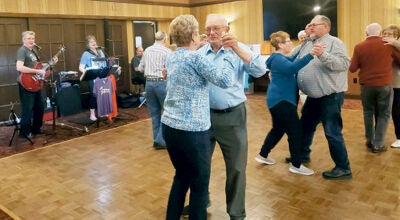Same-sex couples in Austin plan weddings
Published 10:48 am Thursday, August 1, 2013
Gay marriage now legal in Minnesota
A host of new laws enacted during the legislative session in the spring take effect today, and one of the most anticipated is the state’s legalization of same-sex marriage.
Nick Psyck and her girlfriend, Sheila LeDoux, said they plan to marry in October. The Austin couple has been together since 2010 and is raising LeDoux’s two children, ages 18 and 14, together.
“It feels good knowing that we’re going to have the same rights as heterosexual people,“ she said.
The possibility of eventually legalizing same-sex marriage was at risk this time last year. Though it was already not written into law, its opponents pushed to ban it more permanently by putting a constitutional amendment on the ballot during the 2012 elections. The amendment failed across the state as a whole by popular vote, though 57 percent of Mower County voters supported it.
Psyck and LeDoux were among many who worked to quash the amendment.
“We did a lot of rallying in St. Paul,” Psyck said.
Minnesota estimates about 5,000 gay couples will marry during the law’s first year, but the state didn’t analyze how many were already married somewhere else. Local and national gay rights groups said it’s been a frequent practice, though not all states have welcomed non-residents. When Massachusetts became the first U.S. state to legalize gay marriage, for example, only couples who were state residents could get a marriage license.
On Wednesday, Gov. Mark Dayton designated today as “Freedom to Marry Day.”
With Rhode Island and Minnesota becoming the 12th and 13th states to legalize gay marriage, about 30 percent of the U.S. population will live in states with such laws, according to the gay rights group Freedom to Marry.
Some same-sex couples in Minnesota had held ceremonies before the law legalizing marriage went into effect, including several Psyck knows. Many of them intend to have a separate, state-recognized ceremony now.
“The three couples I know are actually going to have another wedding,” she said.
Some same-sex marriages in the state were set to be held as soon after the start of August as possible.
In Mower County, however, Psyck said her impression is people are not about to hurry just because the legalization date has arrived.
“The couples that I know aren’t rushing to do it just because as of Aug. 1 it’s legal,” she said.
For Psyck and LeDoux, not much will change after they tie the knot. In many ways, they will go on about their lives as they have been.
“Everything will be pretty much the same,” Psyck said.
That’s not necessarily the case from an outsider’s standpoint. The status of being legally married may change the way another resident sees a couple like Psyck and LeDoux. For example, Psyck said she knows a heterosexual couple that took her intent to get married regardless of the law as something of a joke. Now that the marriage will be officially recognized by the state, that may change.
“Now that it is real, the view on it is a little different,” she said.
While Psyck expects little will change in she and LeDoux’s daily life, there are still some significant legal changes on the way. For example, if she or her girlfriend were a patient at a hospital, the other would have the same right to see her as a heterosexual spouse would.
“In some aspects, it’s huge,” Psyck said.
With August here, many faith communities feel a new urgency about whether they will perform same-sex weddings, particularly those that have been wrestling with how to address sexual orientation for decades.
Among those torn over the issue are Methodists, who have a unique history on the matter in Minnesota.
“The conflict has been going on for a long time,” said the Rev. Dr. Wesley Gabel, minister at Grace United Methodist Church in Fergus Falls. “The concept of this type of configuration in marriage has not been part of the churches’ history in any way.”
While there are groups seeking a change in the church’s stance, any attempt to marry would be a violation of The Book of Discipline of the United Methodist Church. That means ministers who go against the rules could be met with consequences.
Some faith communities, like ELCA Lutherans, allow individual congregations to make the decision. Other religions have policies set at the national or international level, so a change in Minnesota’s marriage law has little effect.
Other new laws
A host of other new laws will take effect Thursday. Here are a few of the more significant changes:
—Minnesotans will be able to prefund their funeral expenses and pay for them over a period of time.
—Paramedics will need an additional 12 hours of study in clinical topics to renew or earn their certification. The ambulance service medical director must approve the topics.
—Landlords who know a property’s contract for deed is being canceled or mortgage is entering foreclosure must notify the tenants. Those who don’t must face a new $500 civil penalty.
—Local governments can now advertise bids for public improvement projects in a recognized industry trade journal instead of the official newspaper if the project is more than $100,000.
—Underage drinkers looking out for their own health or a friend’s health can now avoid a minor consumption ticket if they call 911 for medical assistance, provide their name and cooperate with authorities on-scene.
—Fake 911 calls will be a misdemeanor on the first call, a gross misdemeanor on the second and felonies for every call thereafter.
—It will now be a gross misdemeanor to assault a public bus or light-rail operator, or to spit on or otherwise transfer bodily fluids onto the operator.
—Non-students will be able to hitch a ride on school buses to get to certain special events.
—The Associated Press contributed to this report.




